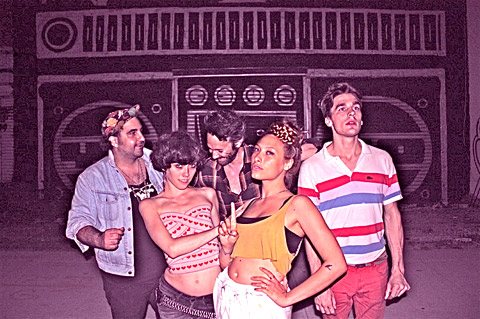
CAUSING EFFECT "Breaking down socially implemented barriers is really important to me," says Samantha Urbani of Friends. "And recognizing when certain ideals have been fed to you." |
When I first came upon the video for "I'm His Girl" by the Brooklyn pop quintet Friends, my mind had already been stuck on the idea of liberation for the better part of a week. It was October 2011, and I was sitting on the floor of my Lower Allston apartment, packing a suitcase for CMJ week in New York, simultaneously clicking around lists of must-see acts. It was two weeks after I started covering Occupy Boston, and though I was organizing a list of buzz bands, all of the social movement's major modes and motivations were slam-dancing around my head: anti-authoritarianism, autonomy, anarchy.So imagine my surprise when, within the first moments of the track's VHS-quality video, a shot panned past a copy of the noted anarchist Emma Goldman's book Anarchism and Other Essays. It seemed placed distinctly for my Occupy-focused eyes.
I mentioned it in a recent conversation with front-lady Samantha Urbani. Was the book's placement deliberate? After all, "I'm His Girl" is a moody love song about being in an open relationship, a radical idea itself. "I'm the one he loves and trusts/He goes out on the town I don't get jealous/It's all about affection not possession with us," she sings on the three-minute jam with poppy funk bass and Tropicalia-inspired percussion.
It's one of the band's two singles — along with their debut, "Friend Crush"— that turned enough heads overseas to land them a spot on BBC's prestigious year-end "Sound of 2012" list and NME's top 50 artists of 2011.
"It's a song based on a romantic relationship, but for me it has a more important meaning," says Urbani. "About not being possessed by anything, whether it's your partner, or the government, society, family, religion . . . doing things because you want to, not because you feel like you need to."
As it turns out, sociopolitical release was on Urbani's mind when writing the song. But it's easy to fall for Friends without ever picking up on their politics: the group's glam-pop '80s-New-York-inspired jams themselves are catchy as hell; they're angsty dance floor hits with sultry vox surrounded by a distinctly downtown aura of cool. "It's funny, I'm getting a total kick out of it," Urbani says. "We're getting played on the main radio station in the UK, and I'm singing, 'I don't need your money, I can grow my own food.' "
Their liberationist ideals transcend lyrics though. Urbani, who was studying at the New School when she dropped out to pursue the band full time, says that questioning the conventions of live shows and engaging with others in the crowd is important to Friends. "Breaking down socially implemented barriers is really important to me," she says. "And recognizing when certain ideals have been fed to you. . . . If there's any statement I want to make, it's to see everyone appreciating their own agency and acting on their ability to make judgments for themselves."